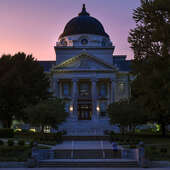2020 Difference Makers: Kenny King & William Marshall

Editor's note: This is one of 12 Newsmakers stories in B Magazine. To read other stories about area Newsmakers, click here. And to subscribe to the print edition of B Magazine, click here.
"This is how everyone will recognize that you are my disciples -- when they see the love you have for each other." (John 13:35, MSG translation)
2020 has been called unusual, unprecedented, unpredictable. Between the global pandemic and racial tension spiking throughout the country, many are left wondering and worrying about the future. But for pastors, Kenny King and William Marshall, of Sikeston, they are choosing to carry on, unfazed.
After merging their two churches last year -- one predominantly white, one predominantly Black -- they are seeing the fruits of their labor and making a difference in the Southeast Missouri community. Their common ground is Jesus. And their message is hope.
Kenny King was born and raised in Sikeston, but moved away for a time before feeling a pull back to his hometown in 2015. He began pastoring a church called Smith Chapel United. During that same year, William Marshall, originally from Tennessee, moved to Sikeston to pastor Trinity Baptist.
In October 2017, they met at a local Fellowship of Christian Athletes event, where King was speaking on a passage in Ephesians 2, about peace and unity within the body of Christ. From this point on, over Bibles and BBQ, a friendship was formed. While they both were doing fine on their own, it was becoming obvious that they "were even better together."
During the Summer of 2018, the congregations began combining a few services, and in September 2019, both churches officially united as Grace Bible Fellowship. They began meeting in the old Trinity building and used Smith Chapel as the community center.
There were changes to the music, discussions about the preaching schedule, and a million other decisions along the way. But the church family has been encouraging and people have leaned into the idea.
"People are looking for the real story," Marshall told B Magazine. "They want to know what's going wrong. But this is it. It's going well."
When COVID-19 emerged, just a few months after the union, pastors everywhere were scrambling. But for King and Marshall, they saw the blessing of not having to go through this kind of thing alone. And then, they had each other again, when just months later, protests in regards to racial discrimination began breaking out across the country.
"It's given us opportunities to talk about our experiences and speak into different situations," King said. "We can live in peace with one another. I want people to see what we are doing and see that Jesus is the only one that can bring us together."
In response to the growing racial tension, Grace Bible Fellowship gathered together for A Solemn Assembly, a familiar practice from the Old Testament, of confessing, repenting and praying. Held in Sikeston, in the very location of the last recorded lynching in the State of Missouri, both Black and white congregants came together to own their own sins and struggles, as a way to find common ground and to move forward together.
This type of work toward racial unity was recognized in Time Magazine, in the March 2020 issue, but they're not in it for the praise and recognition. They want people to know Christ, to be faithful to the Gospel, and to be intentional about seeking out friendships with people who look different than themselves.
It starts by leading with grace, giving each other the benefit of the doubt, and loving each other despite their differences. Both pastors know, and have told their congregants, "We are not always going to get our way." This type of living will require sacrifice. Love requires sacrifice. But by changing the perspective from "me" to "we," that's the true beauty of the Gospel. That is the hope.




























